
We continue the Bullitt County 1850 census written by Mrs. W. V. Mathis, Wallace A. McKay and W. C. Barrickman. Betty Darnell shared this in The Pioneer News.
Here we present two related articles in which various lawyers are described. No census data is included.
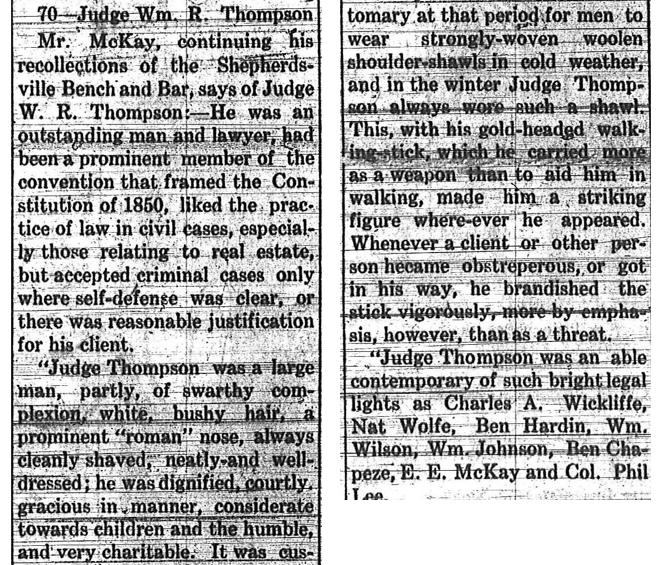
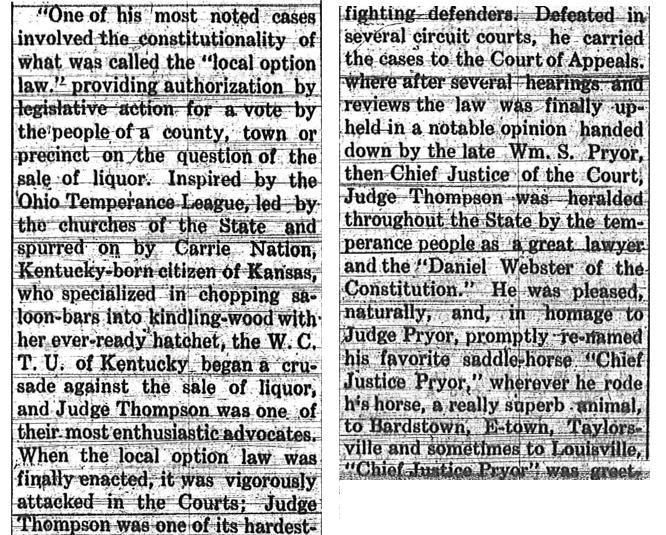
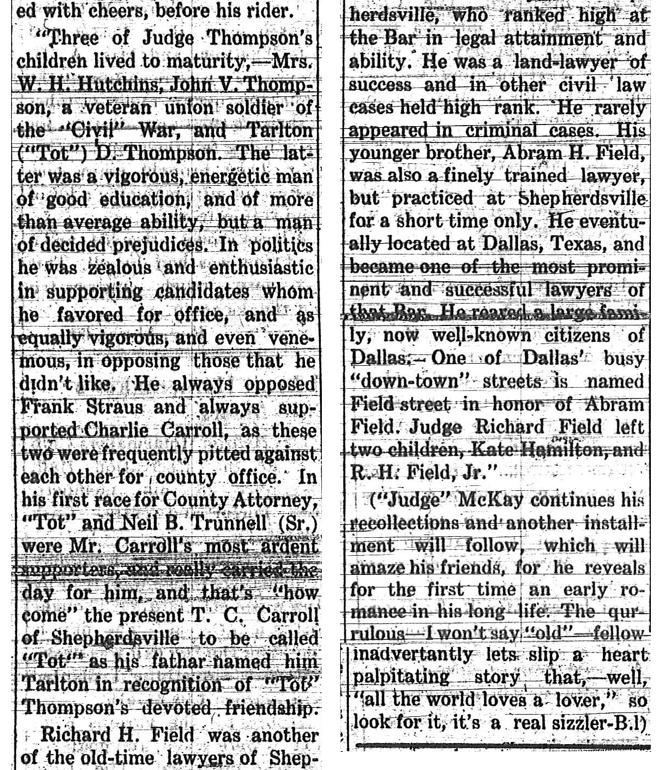
13 October 1950
Judge William R. Thompson
Mr. McKay, continuing his recollections of the Shepherdsville Bench and Bar, says of Judge W. R. Thompson: - He was an outstanding man and lawyer, had been a prominent member of the convention tht framed the Constitution of 1850, like the practice of law in civil cases, especially those relating to real estate, but accepted criminal cases only where self-defense was clear, or there was reasonable justification for his client.
"Judge Thompson was a large man, partly, of swarthy complexion, white, bushy hair, a prominent 'roman' nose, always cleanly shaved, neatly and well-dressed; he was dignified, courtly, gracious in manner, considerate toward children and the humble, and very charitable. It was customary at that period for men to wear strongly-woven woolen shoulder-shawls in cold weather, and in the winter Judge Thompson always wore such a shawl. This, with his gold-headed walking stick, which he carried more as a weapon than to aid him in walking, made him a striking figure where-ever he appeared. Whenever a client or other person became obstreperous, or got in his way, he brandished the stick vigorously, more by emphasis, however, than as a threat.
"Judge Thompson was an able contemporary of such bright legal lights as Charles A. Wickliffe, Nat Wolfe, Ben Hardin, William Wilson, William Johnson, Ben Chapeze, E. E. McKay and Col. Phil Lee.
"One of his most noted cases involved the constitutionality of what was called the 'local option law.' providing authorization by legislative action for a vote by the people of a county, town or precinct on the question of the sale of liquor. Inspired by the Ohio Temperance League, led by the church of the State and spurred on by Carrie Nation, Kentucky-born citizen of Kansas, who specialized in chopping saloon bars into kindling-wood with her ever ready hatchet, the W. C. T. U. of Kentucky began a crusade against the sale of liquor, and Judge Thompson was one of their most enthusiastic advocates. When the local option law was finally enacted, it was vigorously attacked in the Courts; Judge Thompson was one of its hardest-fighting defenders. Defeated in several circuit courts, he carried the cases to the Court of Appeals, where after several hearings and reviews the law ws finally upheld in a notable opinion handed down by the late William S. Pryor, then Chief Justice of the Court. Judge Thompson was heralded throughout the State by the temperance people as a great lawyer and the 'Daniel Webster of the Constitution.' He was pleased naturally, and, in homage to Judge Pryor, promptly re-named his favorite saddle-horse 'Chief Justice Pryor. Whenever he rod his horse, a really superb animal, to Bardstown, E-town, Taylorsville and sometimes to Louisville, 'Chief Justice Pryor' was greeted with cheers, before his rider."
Three of Judge Thompson's children lived to maturity, - Mrs. W. H. Hutchins, John V. Thompson, a veteran Union soldier of the Civil War, and Tarlton ('Tot') D. Thompson. The latter was a vigorous, energetic man of good education, and of more than average ability, but a man of decided prejudices. In politics he was zealous and enthusiastic in supporting candidates whom he favored for office, and as equally vigorous, and even more venemous, in opposing those that he didn't like. He always opposed Frank Straus and always supported Charlie Carroll, as these two were frequently pitted against each other for county office. In his first race for County Attorney, 'Tot' and Neil B. Trunnell Sr. were Mr. Carroll's most ardent supporters, and really carried the day for him, and that' how come the present T. C. Carroll of Shepherdsville to be called 'Tot' as his father named him Tarlton in recognition of 'Tot' Thompson's devoted friendship.
Richard H. Field was another of the old-time lawyers of Shepherdsville, who ranked high at the Bar in legal attainment and ability. He was a land-lawyer of success and in other civil law cases held high rank. He rarely appeared in criminal cases. His younger brother, Abram H. Field, was also a finely trained lawyer, but practiced at Shepherdsville for a short time only. He eventually located at Dallas, Texas, and became one of the most prominent and successful lawyers of that Bar. He reared a large family, now well-known citizens of Dallas. One of Dallas' busy "downtown" streets is named Field street in honor of Abram Field. Judge Richard Field left two children, Kate Hamilton, and R. H. Field, Jr.
("Judge" McKay continues his recollections and another installment will follow, which will amaze his friends, for he reveals for the first time an early romance in his long life. The querulous - I won't say "old" - fellow inadvertantly lets slip a heart palpitating story that, - well, "all the world loves a lover," so look for it, it's a real sizzler - B.l)
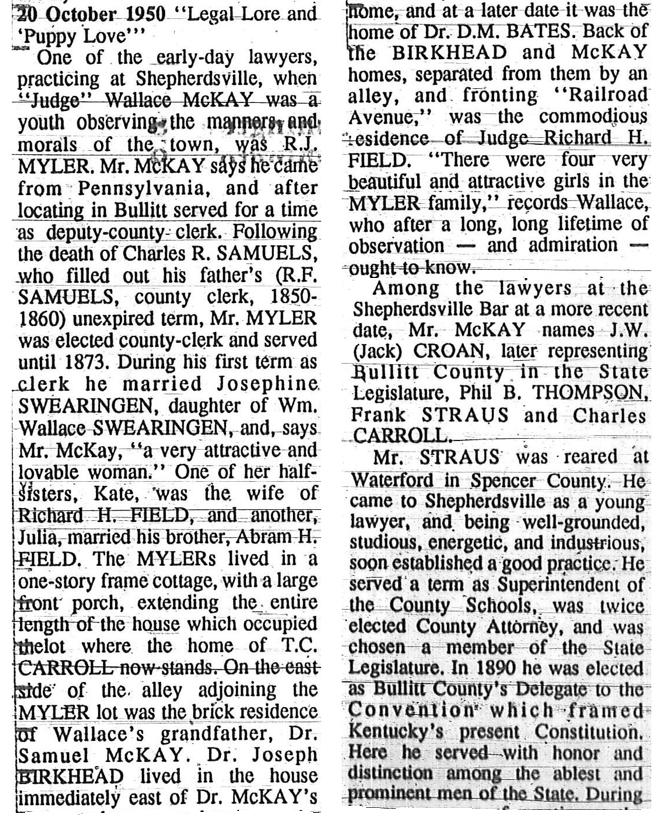
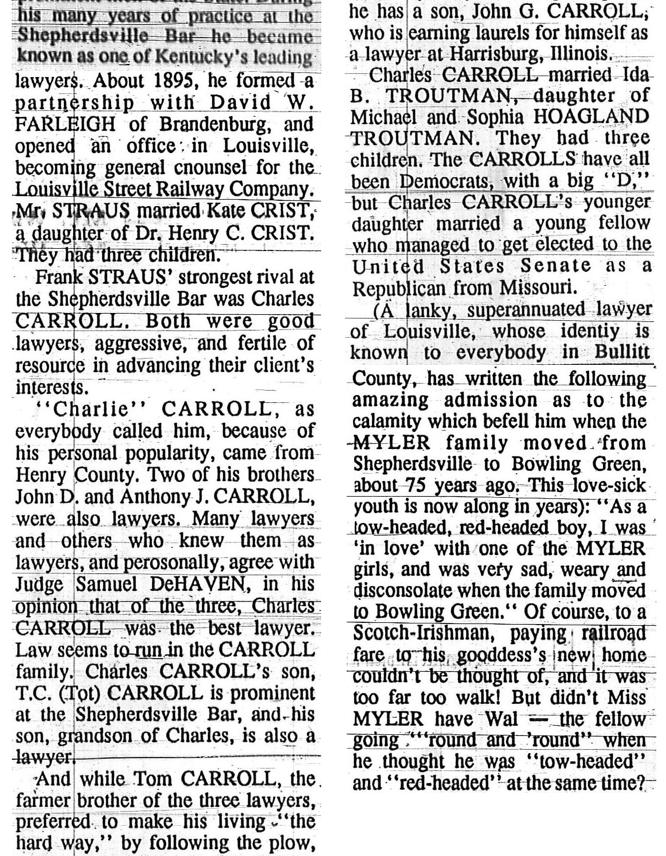
20 October 1950
"Legal Lore and Puppy Love"
One of the early day lawyers, practicing at Shepherdsville, when "Judge" Wallace McKAY was a youth observing the manners and morals of the town, was R. J. MYLER. Mr. McKAY says he came from Pennsylvania, and after locating in Bullitt served for a time as deputy county clerk. Following the death of Charles R. SAMUELS, who filled out his father's (R. F. SAMUELS, county clerk, 1850 1860) unexpired term, Mr. MYLER was elected county clerk and served until 1873. During his first term as clerk he married Josephine SWEARINGEN, daughter of William Wallace SWEARINGEN, and, says Mr. McKay "a very attractive and lovable woman." One of her half sisters, Kate, "was the wife of Richard H. FIELD, and another, Julia, married his brother Abram H. FIELD. The MYLERs lived in a one story frame cottage, with a large front porch, extending the entire length of the house which occupied the lot where the home of T. C. Carroll now stands, On the east sid of the alley adjoining the MYLER lot was the brick residence of Wallace's grandfather, Dr. Samuel McKAY. Dr. Joseph BIRKHEAD lived in the house immediately east of Dr. McKAY's home, and at a later date it was the home of Dr. D. M. BATES. Back of the BIRKHEAD and McKAY homes, separated from them by an alley, and fronting "Railroad Avenue," was the commodious residence of Richard H. FIELD. "There were four very beautiful and attractive girls in the MYLER family," records Wallace, who after a long, long lifetime of observation and admiration ought to know.
Among the lawyers at the Shepherdsville Bar at a more recent date, Mr. McKAY names J. W. (Jack) CROAN, later representing Bullitt County in the State Legislature, Phil B. THOMPSON, Frank STRAUS and Charles CARROLL.
Mr. STRAUS was reared at Waterford in Spencer County. He came to Shepherdsville as a young lawyer, and being well-grounded, studious, energetic, and industrious, soon established a good practice. He served a term as Superintendent of the_County Schools, was twice elected County Attorney, and was chosen a member of the State Legislature. In 1890 he was elected as Bullitt County's Delegate to the Convention which framed Kentucky's present Constitution. Here he served with honor and distinction among the ablest and prominent men of the State. During his many years of practice at the Shepherdsville Bar he became known as one of Kentucky's leading lawyers. About 1895, he formed a partnership with David W. FARLEIGH of Brandenburg, and opened an office in Louisville, becoming general counsel for the Louisville Street Railway Company. Mr. STRAUS married Kate CRIST, a daughter of Dr. Henry C. CRIST. They had three children.
Frank STRAUS' strongest rival at the Shepherdsville Bar was Charles CARROLL. Both were good lawyers , aggressive, and fertile of resoure in advancing their client's interests.
"Charlie" CARROLL, as everybody called him, because of his personal popularity, came from Henry County. Two of his brothers John D. and Anthony J. CARROLL, were also lawyers. Many lawyers and others who knew them as lawyers, and personally, agree with Judge Samuel DeHAVEN, in his opinion that of the three, Charles CARROLL was the best lawyer. Law seems to run in the CARROLL family. Charles CARROLL's son, T. C. (Tot) CARROLL is prominent at the Shepherdsville Bar, and his son, grandson of Charles, is also a lawyer.
And while Tom CARROLL, the farmer brother of the three lawyers, preferred to make his living "the hard way," by following the plow, he has a son, John G. CARROLL, who is earning laurels for himself as a lawyer at Harrisburg, Illinois.
Charles CARROLL married Ida B. TROUTMAN, daughter of Michael and Sophia HOAGLAND TROUTMAN. They had three children. The CARROLLs have all been Democrats, with a big "D," but Charles CARROLL's younger daughter married a young fellow who managed to get elected to the United States Senate as a Republican from Missouri.
(A lanky, superannuated lawyer of Louisville, whose identity is known to everybody in Bullitt County, has written the following amazing admission as to the calamity which befell him when the MYLER family moved from Shepherdsville to Bowling Green about 75 years ago. This love-sick young is now along in years): "As a tow-headed, red-headed boy, I was 'in love' with one of the MYLER girls, and was very sad, weary and disconsolate when the family moved to Bowling Green." Of course, to a Scotch-Irishman, paying railroad fare to his goddess's new home couldn't be thought of, and it was too far to walk! But didn't Miss MYLER have Wal- the fellow going "round and round" when he thought he was "tow-headed" and "red-headed" at the same time?
This project is presented here with the kind permission of Betty Darnell, and The Pioneer News.
If you, the reader, have an interest in any particular part of our county history, and wish to contribute to this effort, use the form on our Contact Us page to send us your comments about this, or any Bullitt County History page. We welcome your comments and suggestions. If you feel that we have misspoken at any point, please feel free to point this out to us.
The Bullitt County History Museum, a service of the Bullitt County Genealogical Society, is located in the county courthouse at 300 South Buckman Street (Highway 61) in Shepherdsville, Kentucky. The museum, along with its research room, is open 10 a.m. to 4 p.m. Monday through Friday. Saturday appointments are available by calling 502-921-0161 during our regular weekday hours. Admission is free. The museum, as part of the Bullitt County Genealogical Society, is a 501(c)3 tax exempt organization and is classified as a 509(a)2 public charity. Contributions and bequests are deductible under section 2055, 2106, or 2522 of the Internal Revenue Code. Page last modified: 14 Sep 2024 . Page URL: bullittcountyhistory.org/bchistory/bd/50-10-13.html